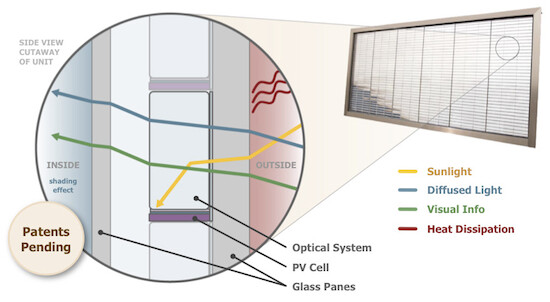As it currently stands with most buildings, the sun’s light is often a burden, especially in summer, when it heats up exteriors and necessitates energy to be spent on cooling. Pythagoras Solar is a company that has created an innovative building-integrated photovoltaics (BIPV) technology that could revolutionise the way that buildings generate and use energy. This technology–called Photovoltaic Glass Unit (PVGU) technology–is a transparent solar panel using standard monocrystalline PV cells that works with the sun, generating power for the building in question while simultaneously reducing the need for electricity for heating, cooling, and artificial lighting.
BIPV: Pythagoras Solar Windows
The purpose of good a building-integrated photovoltaics (BIPV) system is two-fold: to reduce a building’s energy demand, and to produce useable electricity for the building it occupies. In an excellent BIPV system, the BIPV technology will take the place of building components so seamlessly that there should be little or no added cost to their installation vs installation of conventional building parts. Energy costs money, and thanks to a BIPV system’s contribution to increased energy efficiency and energy production, building developers may expect faster returns on investment (ROI) despite the increase in up-front costs associated with the use of cutting-edge technology.

Pythagoras solar windows fulfil the criteria for being excellent BIPV by potentially taking the place of conventional windows; they do everything a window does, with the added benefit of electricity generation. In addition to letting light into the building’s interior like a window, Pythagoras’s PVGU acts as insulation, prevents direct solar radiation from entering a building and therefore improves a space’s interior visual and thermal comfort, and affords greater design flexibility to architects, builders, and engineers. Similar to conventional IGUs (insulated glazing unit–insulated glass windows, etc), Pythagoras modules are generally designed on a per-project basis. Ideally, these factors will all contribute to cost-efficient, beautiful buildings that generate their own energy with a lower negative impact on the environment in terms of carbon emissions and resource use.
Benefits of Pythagoras BIPV Solar Windows
-Generates solar power–delivers an unmatched level of energy generation per unit area (up to 13.5% module conversion efficiency) compared to other BIPV technologies such as thin-film/amorphous silicon.

-Improves building energy efficiency–The PVGU acts as a great thermal barrier (low U-value, high R-value), reducing a building’s heating and cooling loads during more extreme weather events. With 50% visible light penetration rate, there is also less need for artificial lighting, reducing costs and creating a visually comfortable environment.
-Architectural Design Benefits–The prismatic optics allow a high level of transparency and design adaptability. Unlike conventional solar panels, Pythagoras technology’s transparent nature means that they can be utilised in locations that would not ordinarily be an option for conventional solar panels, which are opaque. The technology is already available in windows, skylights, and vertical curtain walls. To add flare to add to Pythagoras technology’s already modern look, color cells will also soon be available.
Although Pythagoras technology is not yet available in Australia, Solar Choice does have an experienced and highly qualified in house architect and consultant who is able to design BIPV solutions. Please send an email to sales@solarchoice.net.au or fill out a free online quote comparison request form in order to commence discussions on what design may be appropriate for you.
Written by James Martin
Solar Choice Analyst
© 2011 Solar Choice Pty Ltd
Sources and Links:
- Monocrystalline vs Polycrystalline Solar Panels: Busting Myths - 11 November, 2024
- Solar Hot Water System: Everything You Need to Know - 27 February, 2024
- Can I add more panels to my existing solar system? - 8 August, 2023
Now 2016 is it available in Australia?
Regards Katrina Cullen
Hi Katrina,
It looks like their website is down, which would indicate that they may have gone out of business, unfortunately. However, there are other companies that offer such products – including Onyx Solar, who you may wish to get in touch with.
From where I can buy such kind of modules ?
Hi Rosen,
They are not available in Australia as of yet. You should be able to contact Pythagoras directly to find out if they are available elsewhere, assuming you do not live in Australia.